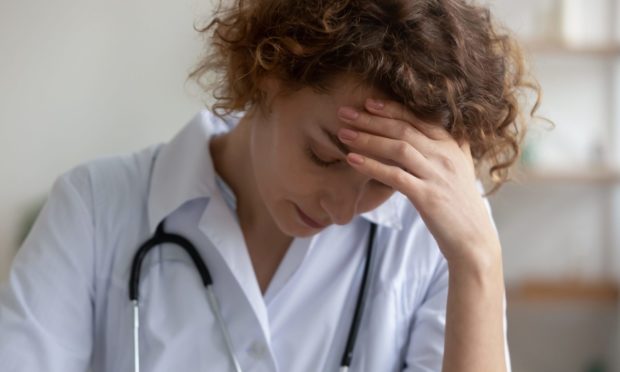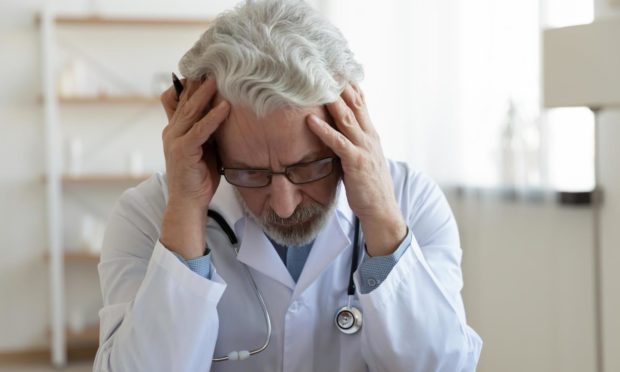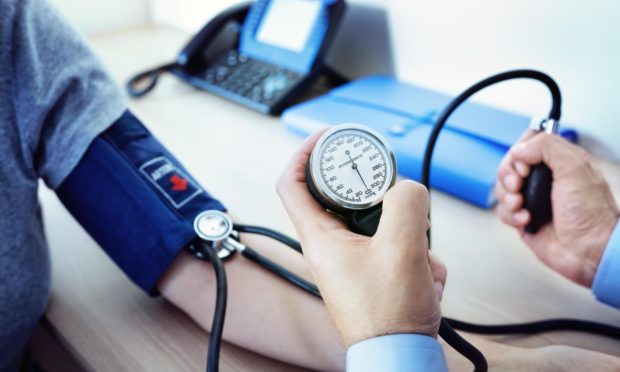Abusive behaviour from the public has left GPs at breaking point.
Research shows a shocking 87.7% of GPs report they or their staff have been subjected to verbal or physical abuse in the past month alone.
The British Medical Association (BMA) Scotland has revealed GPs and practice staff are facing abusive behaviour from members of the public.
Almost two-thirds have said the situation has deteriorated since the pandemic began.
The survey is the latest damning evidence of the effects the pandemic has had on the GP profession.
Tayside GPs, including Dr David Shackles and Dr Amy Knighton recently talked about the post-pandemic impact.
And just last month, GP receptionist Catherine Robertson from Taymount surgery in Perth highlighted the issue of abuse from patients, which led to letters being sent out warning against abusive behaviour.
The Royal College of General Practitioner’s (RCGP) has already called for the new Health Minister Humza Yousaf MSP to meet with them to discuss concerns.
The Scottish Government confirmed they are committed to supporting GPs as well as the wider health and social care workforce and will engage with the BMA and others.
Dr Andrew Buist, chair of the BMA’s Scottish GP Committee, said: “The results of this survey make for extremely difficult and disappointing reading.
“GPs in Scotland are at breaking point with ever-increasing workloads.
“The current situation is causing frustration among members of the public, which is understandable to a point.
“However, no matter how challenging this is for us all, it is utterly unacceptable that GPs and their practice staff are being subjected to verbal or physical abuse. This, coupled with unmanageable workloads and a poor work/life balance will of course have a real impact on GPs and their staff’s mental and physical wellbeing. We are only human after all.”
A snap survey of GPs in Scotland has found they are breaking point with high demand and increasing pressure – read more from SGPC chair @AndrewBuist17 here:https://t.co/OX6BkQjizo
— BMA Scotland (@BMAScotland) May 26, 2021
That was echoed by the RCGP Scotland Joint Chief Dr Chris Williams who added: “Let me be very clear when I say abuse of any kind is unacceptable and I am distressed to read nine out of 10 GPs have been met with either verbal or physical abuse within the last month.”
Abuse, workloads and concerns
The BMA survey also reveals:
- 70% of GPs are now more likely to take early retirement or leave.
- 73.3% are struggling to cope with work and say it’s impacting their physical and mental wellbeing.
- 66.8% say their current workload is unmanageable.
- 57% say it has worsened since the pandemic.
- 62% feel unable to achieve a good work/life balance.
- Almost 40% say this is impacting their lives outside work.
A shortage of GPs in Scotland is also having a negative impact and must be addressed with urgency, Dr Buist continued.
“We urgently need reassurance from the Scottish Government that general practice will be adequately supported as we recover from this pandemic. We need their support to ensure that public messaging around the work of general practice is consistent and honest.
“GPs can only work within the limitations we face right now, and we need the Scottish Government, and indeed all politicians, to be clear and realistic in their messaging about just what is possible for GPs at the moment.
“We also need an unambiguous statement from our political leaders the public must be patient and understanding and that abuse of health and social care staff trying to do their best in difficult circumstances is unacceptable.”
Dr Williams added the RCGP Scotland is also calling for a national conversation with the public on what general practice can delivery realistically with current capacity.
‘Incredible work in difficult circumstances’
A Scottish Government spokesperson said they are committed to supporting GPs and the health and social care workforce: “They are doing incredible work, in extremely difficult circumstances.
“The pandemic has impacted on all aspects of our lives and those on the frontline, perhaps more than most, will be feeling an added strain on their mental health and wellbeing.”
Remobilising the NHS and producing a National Recovery Plan are being actioned. Services to support staff include the National Wellbeing Hub and a confidential National Helpline for health and social care staff operated by NHS 24.
Significant investment in a range of recruitment and retention support, including coaching and mentoring, to show being a GP remains an attractive career choice, is also in place, all in consultation with the BMA and other representatives of workers.
A greater share of NHS frontline investment including at least a 25% increase to primary care is planned.
The spokesperson added: “The Cabinet Secretary for Health and Social Care will be engaging with the BMA and others on issues facing the health care workforce and what more we might do to support them at this time. Primary Care is the bedrock of the NHS.”



